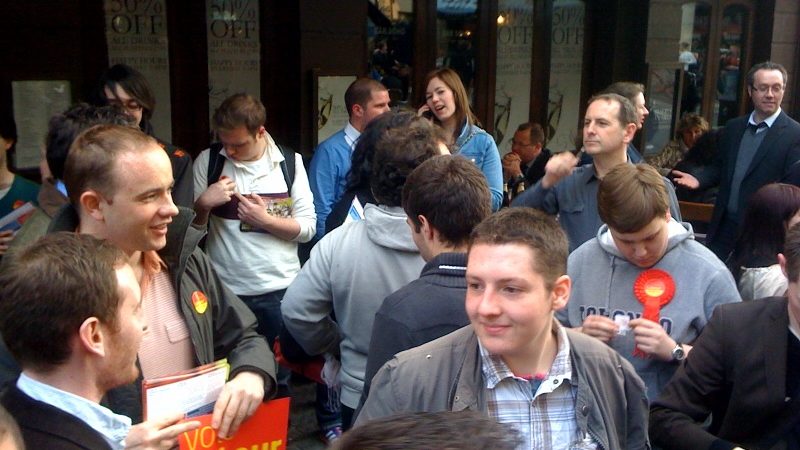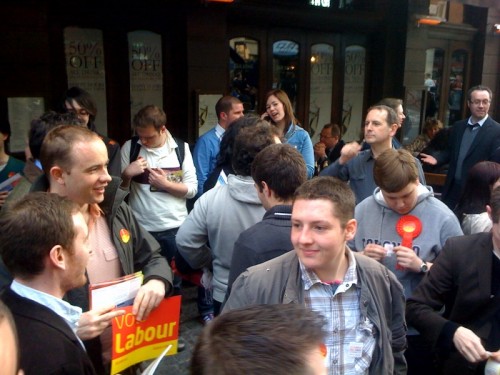
I ask because last week I found myself accidentally announcing the date of the official Labour Party campaign launch. I even told the Telegraph’s live politics blog that I’d be running the, ahem, how-many-sweets-in-a-jar contest (see 11:40am). Of course, I was in fact talking about the local launch of Harriet Harman’s re-election campaign in a bar in Peckham – a key event for her local members and supporters, but probably not one the entire Westminster lobby need clear their diaries for.
Now, memo to party HQ: I extorted a whopping £66 from Camberwell and Peckham comrades and am available for jar duty should you need me for major party events in future. But, much as this made me laugh, it also made me think about the ways in which the role played by local parties and their members is almost entirely absent from the media radar, in comparison to “voters” writ large, and how this might influence public understanding of politics.
Party membership may be at a historic low, but the latest numbers still have Labour on 190,000 party members. That’s an average of nearly 300 per seat, which in turn is around 10% of some MPs’ total number of votes. That’s not inconsiderable as a bloc in itself, but of course what’s really important about local members is everything they do in the run-up to polling day.

Candidates can’t get in front of voters until they get past their local members first; we select them and, in rare circumstances, deselect them. And, as annoying as many journalists find the constant stream of cheery #labourdoorstep tweets, in a country where Question Time gets under 3 million voters from an electorate of 15 times that, what they’re seeing is the actual day-to-day business of how elections are won. That surely makes party members, of all political colours, a not inconsiderable factor if you wish to understand the interests that shape the behaviour of MPs, and by extension, the governments they form.
An obvious example is the rise of our very own leader, still one of the greatest upsets to political journalism in recent memory. But understand the high expectations of Labour members in a safe seat like Doncaster North and you might be less likely to underestimate a man who, just turned 35 (marginally younger than when his brother did likewise), walked into hundreds of strangers’ living rooms in a seat miles away from anywhere he had ever lived or worked, and persuaded them he was the candidate for them. It might similarly make them less likely to assume it’s a done deal when a candidate with a certain surname or a particular CV is rumoured to be seeking selection.
Perhaps the problem is that those who only encounter political parties through their well-honed media messaging channels overestimate how much can ever be dictated from the centre when you’re dealing with volunteers, rather than staff. Of course it would be foolish to suggest the power of connections and nods from on high don’t exist at that level, as they do in all organisations with a hierarchy. But I’d like to see a political journalist rock up at your average-sized CLP meeting and then tell me how they imagine a group of people that usually ranges from Marxist to Blairite and every shade of Labour opinion in-between can be that easy to manipulate. By what mechanism, what incentives, could this even happen? After all, members pay the party, not vice versa. And no, not everyone is trying their best to look permanently enthusiastic about everything the leadership does, in the hope it’ll ease their path to selection.
In fact, I think the toughness of the questions members feel it’s their right to ask- not to mention the thoroughness of the answers they get- would be a revelation to those who think Jeremy Paxman or John Humphrys the last word in interrogation. Not that one needs another reason to think the Today programme is a bit of a waste of time, but this one certainly does it for me every month.
But more seriously, it is surely a fairly important caveat to the prevailing “everyone hates politics” narrative to acknowledge the existence of thousands of ordinary people who still give up their weekday evenings and Saturday lie-ins to support a political party. And when those people have a real say in deciding who gets some of the biggest prizes in politics- as London Labours members will do shortly when the mayoral candidate selection kicks off on 8th May- perhaps it’s about time journalists made a bit more of an effort to understand what members do, what they want, and what that means for party decision-making. After all, the prize for those who do is the chance to present a truer, rounder picture of modern-day politics to a public which deserves to understand it. I might even throw in a spare sherbet lemon or two from that now-infamous jar.




More from LabourList
‘Labour won’t win back left defectors with squeeze messaging alone’
‘Help shape the next stage of Labour’s national renewal through the 2026 NPF consultation’
‘AI regulation is key to Labour’s climate credibility’